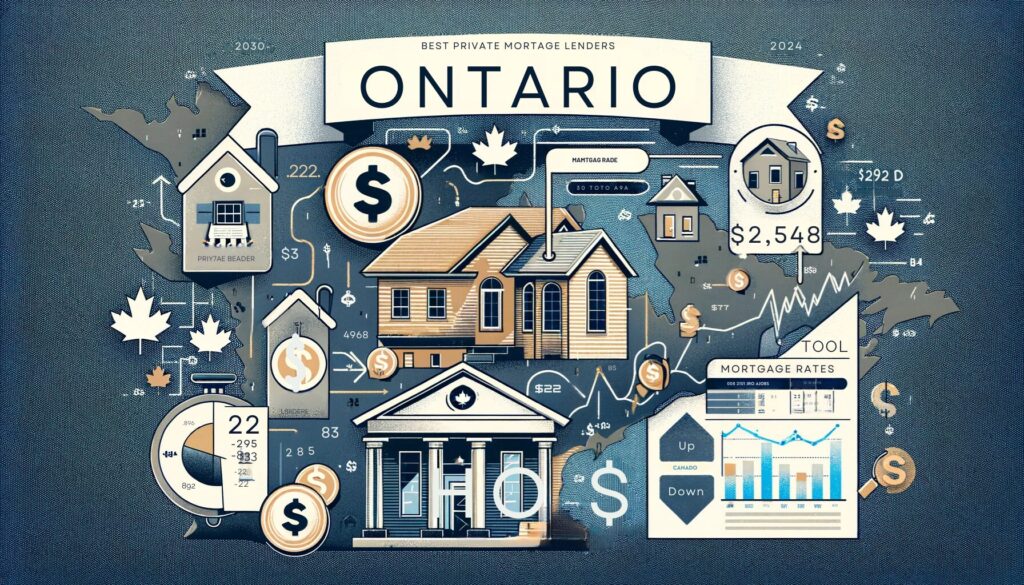When it comes to securing a mortgage in Ontario, there are various options to consider. While traditional lenders have long been the go-to choice for many homebuyers, private mortgage lenders have gained popularity due to their flexible lending criteria and tailored solutions. In this article, we will explore the world of private mortgage lending in Ontario, from understanding the role of private lenders to comparing the best options available in 2024.
How to choose the best private mortgage lender in Ontario?
Factors to consider when selecting a private mortgage lender go beyond the interest rates and loan terms. It’s important for borrowers to assess the level of customer service, transparency, and responsiveness provided by the lender. Additionally, understanding the mortgage rates offered by private lenders in Ontario is crucial, as these rates can vary significantly among different lenders.
Importance of credit score when dealing with private mortgage lenders cannot be overstated. While some private lenders may be more lenient with credit requirements, a higher credit score can still result in better loan terms and lower interest rates. Borrowers should take steps to improve their credit score before approaching private lenders to maximize their chances of securing favorable terms.
What are the steps to get a private mortgage in Ontario?
Understanding the application process for a private mortgage is the first step in embarking on this financing journey. Private mortgage lenders often have a streamlined application process compared to traditional lenders, which can result in quicker approvals and funding. However, borrowers should be prepared to provide thorough documentation of their financial situation and property details to support their application.
Requirements for obtaining a private mortgage in Ontario may differ from one lender to another. While some may prioritize the value of the property as collateral, others may place more emphasis on the borrower’s income stability and credit history. It’s important for borrowers to assess their eligibility based on the specific requirements of each lender.
The benefits of working with a mortgage broker for a private mortgage should not be overlooked. Mortgage brokers can leverage their industry expertise and connections to match borrowers with the most suitable private lenders and negotiate favourable terms on their behalf. This can save borrowers valuable time and effort while ensuring they secure the best possible financing options.
Comparing the best private mortgage lenders in Ontario for 2024

Evaluating the mortgage rates and terms offered by top private mortgage lenders is essential for making an informed decision. While interest rates are a key factor, borrowers should also consider the overall loan terms, including the mortgage term, flexibility in payments, and the potential for refinancing or early repayment without hefty penalties.
Assessing customer reviews and experiences with different private mortgage lenders can provide valuable insights into the lender’s reputation and reliability. Borrowers should pay attention to feedback regarding the lender’s responsiveness, transparency, and willingness to accommodate unique financial situations.
Understanding the variety of mortgage products offered by the top private lenders is crucial for matching the borrower’s needs with the lender’s offerings. Whether it’s a first mortgage, second mortgage, or home equity loan, borrowers should seek lenders that can tailor their products to align with their specific financing goals.
What are the current trends in private mortgage lending in Ontario for 2024?
Analysis of the interest rate trends in private mortgages for 2024 can shed light on the direction of the market and help borrowers make informed decisions. By staying informed about interest rate movements and market projections, borrowers can strategize their mortgage plans to align with favourable market conditions.
The impact of economic factors on private mortgage rates in Ontario should be considered, as these rates can be influenced by changes in the economy, housing market, and regulatory policies. Borrowers need to stay updated on these factors and how they may affect their mortgage financing options.
Advancements in the technology and processes used by private mortgage lenders are shaping the borrowing experience. From streamlined online applications to digital document submissions, borrowers can benefit from improved efficiency and convenience when working with modern private lenders. Understanding how these advancements can benefit them can help borrowers choose the most suitable private mortgage lender.
1. What is a Private Mortgage and How Does it Differ from Traditional Mortgages?
A private mortgage is a loan provided by an individual or a non-bank financial institution. Unlike traditional mortgages offered by banks or credit unions, private mortgages often cater to those with unique financial situations, like a lower credit score or irregular income. They typically come with higher interest rates and fees, reflecting the increased risk assumed by the private lender.
2. The Rise of Private Mortgage Lenders in Ontario
In recent years, Ontario has seen a significant increase in the number of private mortgage lenders. This growth is partly due to stricter mortgage regulations and the rising property prices, making it challenging for many to secure traditional mortgages.
3. Why Consider a Private Mortgage in Ontario?
Private mortgages can be a viable option for those who may not qualify for a traditional mortgage due to bad credit or unconventional income sources. They also offer faster approval times, making them ideal for time-sensitive investments.
4. How to Find the Best Private Mortgage Lender in Ontario
Finding the right lender involves researching their reputation, rates, and terms. Look for lenders with transparent processes and positive client reviews. Consulting with a mortgage broker can also provide valuable insights.
5. Understanding Mortgage Rates and Fees with Private Lenders
Private mortgages generally have higher interest rates and fees compared to traditional mortgages. It’s crucial to compare these costs among different lenders to find the most favourable terms.
6. The Role of Credit Scores in Private Mortgage Approval
While private lenders may be more flexible with credit scores, a better score can still influence the terms of your mortgage. Borrowers with higher scores might secure lower interest rates.
7. Navigating the Private Mortgage Application Process
The application process for a private mortgage involves submitting financial documents and undergoing a property appraisal. It’s essential to be thorough and accurate in your application to increase approval chances.
8. Private Mortgage Investment: A Growing Trend in Ontario
Investing in private mortgages can offer higher returns compared to traditional investments. However, it’s important to understand the associated risks, such as the potential for borrower default.
9. Choosing Between First and Second Private Mortgages
First mortgages are typically used for purchasing a property, while second mortgages are often for accessing home equity. Each has its advantages and should be chosen based on your financial goals.
10. The Future of Private Mortgages in Ontario
The private mortgage sector in Ontario is likely to continue growing. Potential borrowers should stay informed about regulatory changes and market trends to make the best decisions.
- Private mortgages offer a flexible alternative to traditional mortgages, especially for those with unique financial situations.
- Higher interest rates and fees are typical but can be offset by the benefits of quicker approvals and less stringent credit requirements.
- Thorough research and understanding of private mortgage lenders, rates, and terms are crucial for making an informed decision.
- The private mortgage market in Ontario is dynamic, and staying updated with trends and regulations is the key to your financial well-being.


